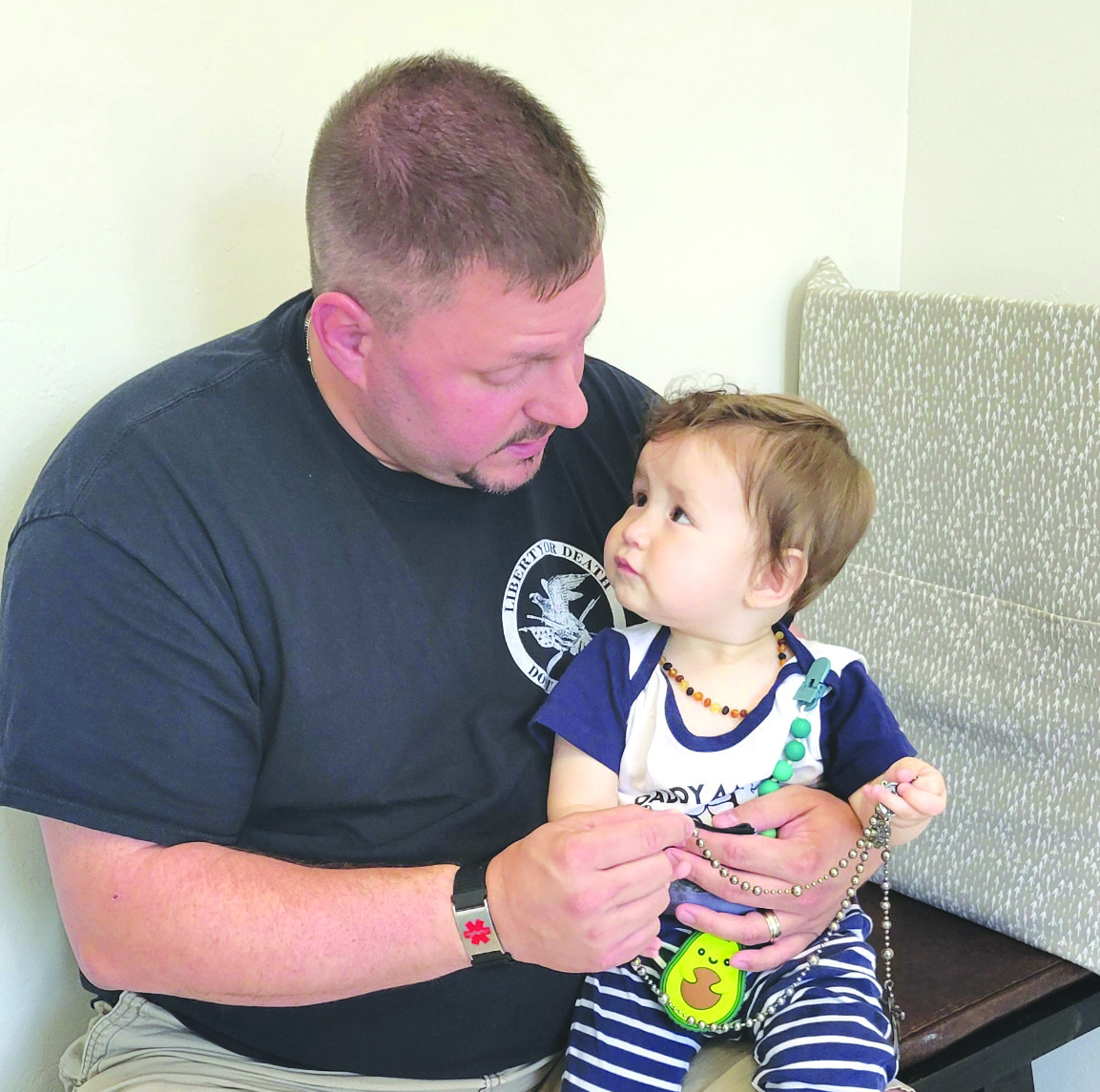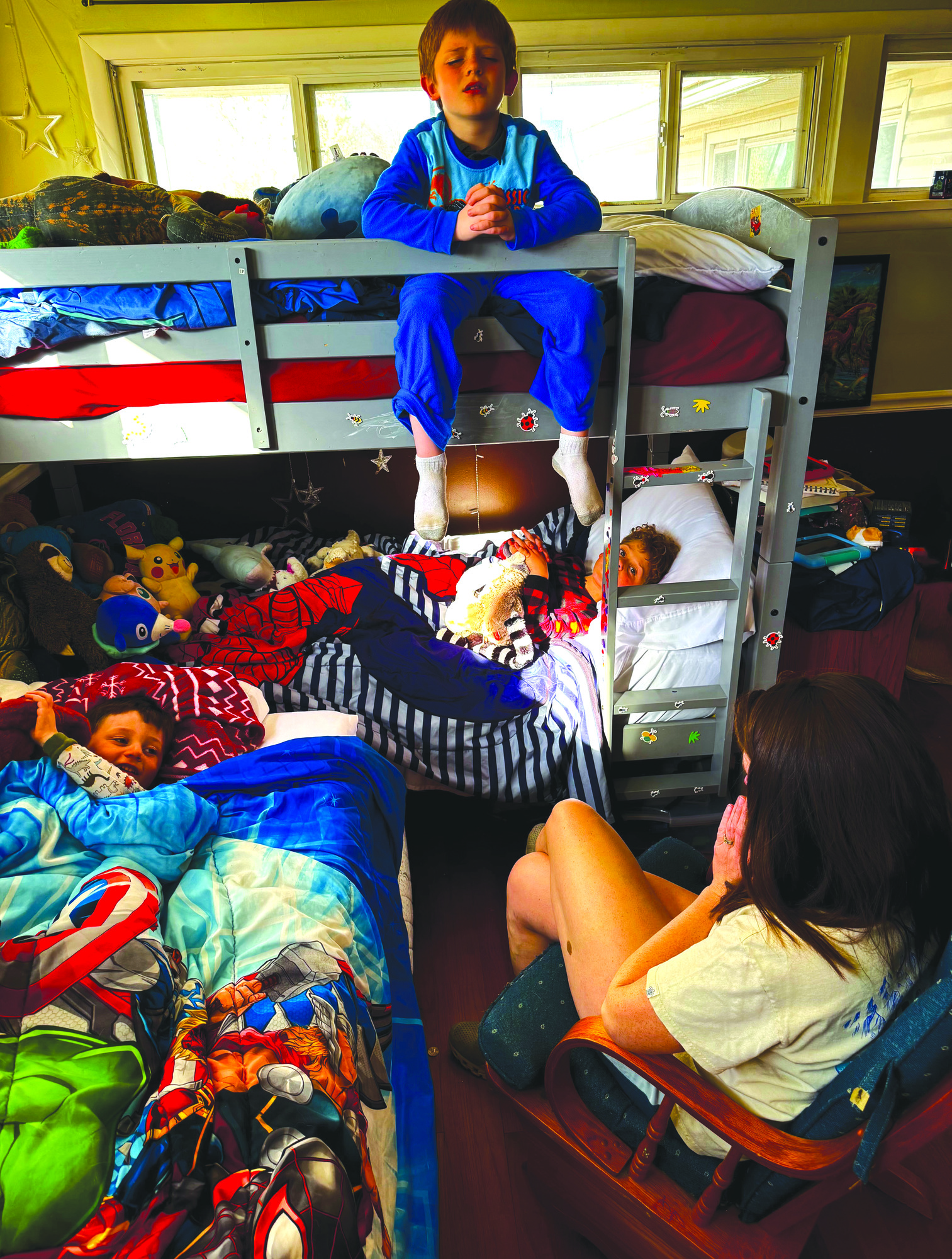-
 July 30, 2025In theory, sitting down to family dinner and opening in prayer seems easily attainable. Similarly, integrating traditional Catholic prayers into everyday life or praying the rosary frequently doesn’t sound all that challenging.
July 30, 2025In theory, sitting down to family dinner and opening in prayer seems easily attainable. Similarly, integrating traditional Catholic prayers into everyday life or praying the rosary frequently doesn’t sound all that challenging.
Life and busy schedules, however, can betray even the modest of goals for any good Catholic.
Haley Wooten, a widowed mother to three boys under the age of 10, knows the struggle. Their schedules are demanding, with Haley attending school part-time and the boys engaged in extracurricular activities beyond their own schoolwork.
Still, committed to the concept of the “domestic church,” Wooten recognizes the importance prayer brings to their lives, thereby enriching their faith as parishioners of Saint Francis Xavier Catholic Church in Enid.
“We pray the Our Father, Hail Mary, and the Fatima Prayer every night at bedtime, and then each child prays a personal prayer,” said Haley, mother to Elijah, 8, Ezra, 6, and Joseph, 3.
“Sometimes the personal prayer is linked to gratitude, or sometimes it’s for help on a test or for a sick friend. Whatever is on their heart they bring to God in that moment with all of us there to support them.”
The phrase domestic church has been used to describe families since the beginning of Christianity. In his Letter to Families, Pope Saint John Paul II wrote, “The Fathers of the Church, in the Christian tradition, have spoken of the family as a ‘domestic church,’ a ‘little church.’”
The Knights of Columbus suggest the domestic church is believing that how people live their faith in their councils, families, parishes and community has a ripple effect that changes the world.
According to the Second Vatican Council’s Dogmatic Constitution on the Church, via the United States Conference of Catholic Bishops, “the family, is so to speak, the domestic church.” This means that it is in the context of the family that we first learn who God is and to prayerfully seek his will for us.
“My goal is to teach them to always turn to God during times of struggle but never to forget prayers of praise and thanksgiving,” said Wooten. “My hope (as their mother) is if I teach them young it will be a habit and something they turn to when they are older.”
Across the country and in the Archdiocese of Oklahoma City, many parishes are implementing domestic church programming, built around young families with the notion that this will keep their children committed to their faith.
“Saying yes to the dress is easy, but having a holy sacramental marriage is the hard part,” said Deacon Val Ross of Saint Francis Xavier and Saint Gregory the Great Catholic Churches in Enid. “In today’s society we are so distracted by everything and sometimes our marriages take the greatest toll.
“A holy, sacramental marriage is today what the world will be tomorrow. We must be very intentional with our faith. We must be very direct and put God first in our marriages and our families and everything we do because that is all that matters. Everything else is secondary. When we die it’s just you and God.”
One document of the Second Vatican Council describes the family as the “domestic church” because it is the first place where young, baptized Christians learn about their faith. In many viewpoints, the domestic church is the answer to every parent’s hope of keeping their children in the Faith.
“As the ‘primary educators’ of our children, the most important instruction that is bestowed upon them is how to live as disciples of the Lord through prayer and action,” Deacon Ross said. “Mothers and fathers must first seek holiness on their accord before they can lead their children down a holy path of forgiveness and redemption with the Lord.”
Andrea and Toby Plucinski, also Saint Francis Xavier parishioners and parents of a 20-month-old boy, embrace the domestic church, in hope of setting a proper environment for their son to rise in the Catholic faith.
“We try to implement and weave God into all the different pieces of our life,” Andrea said. “We have crucifixes, holy water and images of Jesus, Mary and the saints visible within all areas of our home. It’s important to expose your children to them and name them, normalizing it.
“We routinely recite morning prayers, nighttime prayers, mealtime prayers. When you start them young and make it part of what you do – talking to God – and pray consistently and lead by example, we believe he will grow up with a great appreciation of talking to God.”
With more than 15 years of teaching experience at the preschool level (at three different Catholic schools through the course of her career), Andrea is no stranger to young children and their untapped abilities.
“Through my years of teaching, I developed an appreciation for the depth of our faith and the amazement of how young children can internalize how rich our faith is,” she said. “I witnessed really beautiful things while teaching and how a group of 4-year olds can absolutely absorb way more than many assume. I have borrowed my experiences from teaching and have applied them to my parenting style.”
Andrea said she and her husband have goals of further expanding their commitment to their own version of the domestic church, instilling age-old traditions of the church.
“My husband prays the rosary daily and gives our son a rosary while praying it. (He) sits and watches him pray and understands this is serious and important, treating the rosary differently than his toys.
“One of my goals is to incorporate more traditions of the church into our home, such as feast days, exposing our son to baseline traditions that have been lost.”
In many homes that are applying virtuous domestic church practices, parents blessing their children’s foreheads has become a daily practice. For baptized laypersons, blessing people and objects and places in certain situations, such as the home is allowed. Some might say we are called to do so.
“We have always blessed our son on the forehead whenever we say goodbye or goodnight, and because of observing it, he started doing it too,” Andrea said. “He especially loves using the holy water. He has to give everyone in the room blessings on the head and always makes sure no one is left out.
“It is so adorable to see his tiny, outstretched hand touching the top of people's heads, as they bow their heads in reverence. Even people we know who aren't religious can't help but love his blessings. Talk about evangelization by example.”
Joanna Borelli is a freelance writer for the Sooner Catholic.
See related story: Domestic Church presents retreat for married couples
Photo: (Above) Toby Plucinski’s son prayed before his meal. Photo provided. Toby Plucinski prayed the Rosary with his son. Photo provided.
Toby Plucinski prayed the Rosary with his son. Photo provided. Haley Wooten and her children prayed together before bedtime. Photo provided.
Haley Wooten and her children prayed together before bedtime. Photo provided.
